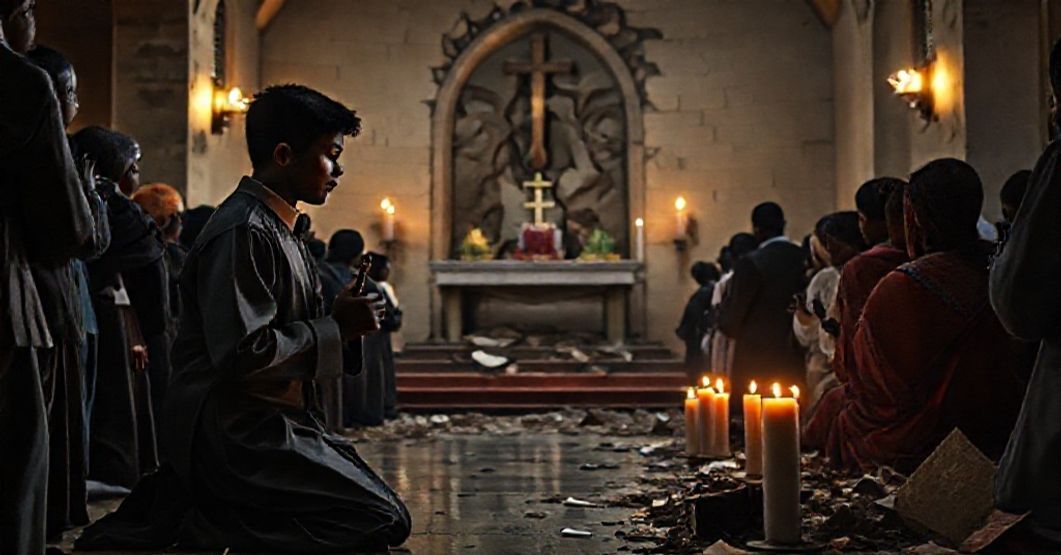Nigerian Seminary Tragedy Exposes Conciliar Sect’s Spiritual Bankruptcy
Catholic News Agency reports on the aftermath of a July 2025 attack on Immaculate Conception Minor Seminary in Nigeria’s Auchi diocese, where three seminarians were kidnapped. Two were released months later (Japhet Jesse and Joshua Aleobua), while Emmanuel Alabi died in captivity. Security guard Christopher Aweneghieme was killed during the initial attack. Bishop Gabriel Dunia called for government security measures while cautioning politicians against prioritizing electoral ambitions over security ahead of 2027 elections. The diocese’s communications director framed the tragedy within generalized appeals for “peace, healing, and security.”
Naturalistic Reduction of Persecution
The conciliar sect’s response to this martyrdom event exemplifies the naturalism condemned in Pius IX’s Syllabus of Errors (1864). Bishop Dunia’s exclusive focus on governmental security measures (“government knows how to deal with this — they have the intelligence and the resources”) constitutes an implicit denial of Christus Rex‘s dominion over nations. Pius XI’s Quas Primas (1925) explicitly teaches that “the hope of lasting peace will not yet shine upon nations as long as individuals and states renounce and do not wish to recognize the reign of our Savior.” The absence of any call for Nigeria’s consecration to Christ the King or public acts of reparation reveals the conciliar establishment’s fundamental disbelief in the supernatural order.
Omission of Supernatural Realities
Nowhere does the report mention the martyred seminarian’s state of grace, the need for sacramental confession during captivity, or the eternal implications of violent death. This silence constitutes tacit acceptance of religious indifferentism condemned by Pius IX (Syllabus of Errors, propositions 16-18). The diocese’s statement reduces Emmanuel Alabi’s death to a mere “passing” and “tragedy,” avoiding any assessment of whether he died in odium fidei. Compare this to pre-conciliar martyrologies that meticulously documented persecutors’ motives and victims’ final professions of faith. The conciliar sect’s inability to proclaim martyrdom stems from its Modernist rejection of objective truth, as condemned in St. Pius X’s Lamentabili (propositions 1-3, 21-22).
Sacramental Apostasy in Seminary Formation
The attacked “seminary” belongs to the conciliar establishment that promulgates the invalid Novus Ordo rite. As the False Fatima Apparitions file demonstrates, Modernist structures replace true asceticism with psychological manipulation. These kidnapped youths were being formed in an institution that denies the propitiatory nature of the Mass (contrary to Trent Session XXII). Their ordeal constitutes divine justice upon a pseudo-seminary teaching heresy, as warned in Jeremiah 23:11: “Both prophet and priest are profane: yea, in my house have I found their wickedness.”
Complicity with Masonic Governance Structures
Bishop Dunia’s appeal to “security agencies” and “all levels of government” ignores Pius IX’s condemnation of states that “seem to deny by their actions the Catholic faith they claim to profess” (Syllabus of Errors). The Nigerian government has systematically persecuted true Catholics while tolerating Islamic violence. By urging collaboration with these anti-Christian authorities, the conciliar hierarchy fulfills Masonic goals exposed in False Fatima Apparitions: “The Church of the New Advent serves to legitimize dialogue with schismatic Orthodoxy” while ignoring “enemies within.”
False Ecumenism in Mourning
The diocese’s generic prayer request (“join us in praying for the repose of the soul of Emmanuel Alabi”) presumes his salvation without evidence of final perseverance. This violates traditional eschatology requiring judgment of particular souls to God alone (De Auxiliis controversies). The Modernist formulation “values of faith, peace, and justice” replaces Catholic dogma with humanitarian slogans, implementing the condemned proposition that “Christian doctrine was initially Jewish, but through gradual development, it became first Pauline… and finally Greek and universal” (Lamentabili, proposition 60).
The conciliar sect’s handling of this Nigerian tragedy confirms its complete rupture from Catholic tradition. Where pre-1958 popes would have called for Eucharistic crusades and national consecration, the Novus Ordo establishment offers only political platitudes and psychological counseling. This institutional apostasy leaves faithful Catholics no recourse but separation from these counterfeit structures, as canon 188.4 declares all offices vacant when holders publicly defect from Catholic faith.
Source:
2 Nigerian minor seminarians released months after kidnapping, 1 killed in captivity (catholicnewsagency.com)
Article date: 05.11.2025
